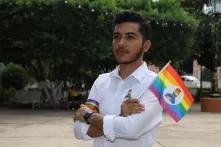The region has the largest network of subterranean rivers in the world; its objective is to preserve natural resources in spite of large polluting companies. Yamili Salazar Ku is a young Environmental Engineering graduate who, since 2013, has been leading the largest network of water guardians throughout the Yucatan. She promotes environmental education, water care and human rights.

Text: Abraham Bote Tun
Photos: Javier Escalante Rosado
Ha'kanules in Maya means guardians of the water. This group comprises children, young people and adults from various Mayan communities throughout the state, who carry out their own water quality monitoring using portable laboratories in cenotes within the region.
Today, this network is made up of more than 100 people and the guardians are present in 15 communities throughout the state.
For its work, the group has received several local, national and international awards, but beyond these distinctions, what motivates it to continue is to generate a change of awareness in the population; and become agents of change for the benefit of their communities and their environment.
“If the people themselves get involved and are part of the process, they start to generate data that also becomes relevant and also helps them become aware of the issue," she explains.
In Yucatan, according to estimates by local authorities, there are approximately 3,000 cenotes, the only source of fresh water in the state; However, they are currently threatened by various industries and toxic substances.
A recent report by the international organization Fundación para el Debido Proceso (Due Process of Law Foundation) (DPLF) reveals the extensive contamination affecting the Yucatan Peninsula's Cenotes Ring.
The investigation details the serious state of groundwater contamination, in which the contaminants detected exceed the limits allowed by official Mexican and international standards.
“This situation represents a severe threat to the health of humans, but also of other species and the ecosystem as a whole," she warns.
According to the document, the main problems related to water pollution in the Cenotes Ring include insufficient regulation and infrastructure; the presence of highly hazardous pesticides, nitrates and heavy metals, all of which are carcinogenic, waste from pig and poultry farms, as well as other pollutants associated with population growth, urbanization, industrial activities and tourism.
Yamili, who is also a student of agroecology, explains that the project was born while she was still a student, in 2013, and had the desire to create collectivity and volunteer work to make a visible impact on society and its rural communities.
The pilot test was launched in Tekit and was self-financed., Workshops were conducted on water awareness, waste management and diagnostic analysis of the quality of the water bodies.
“The main focus is water conservation," says the environmental activist, who emphasizes that Ha'kanules has transcended her original aim, and has been adopted as a way of life thanks to the will of the people who make up this network.
In addition to the fact that humans are themselves the main cause of environmental problems, this project focuses on humans providing the main solutions as well.
Yamili affirms that one of the great impacts of this initiative is the chain effect it has generated within the population; The water guardians who have been trained over the years are now also replicating these actions as facilitators in their communities.
“They do things on their own initiative, they train other young people through collaborations with other groups, they do clean-up work, put up signs and address environmental entrepreneurship issues," she says.
They also work on human rights issues, non-violence against women, the human right to water and the defense of territory.
Salazar Ku confesses that she became aware of many environmental issues during her environmental engineering studies, but she was not taught how to work with society and the community. “Even if we have the best engineering designs, if they are not validated by the community, they are of no use," she says. That is why, with this project, she has applied her knowledge in a simple way so that children can apply it for the benefit of their environment and the cenotes.
For the environmental defender, it is not only about generating actions but also awareness and sensitization; she hopes that the guardians can implement concrete measures to reduce their water footprint, carbon footprint and negative environmental impacts.
For the young woman, this project is her life; her motivation is to crystallize a dream: “to see that there is a whole network of people working for the environment, looking after water. If we don't take care of it, there will be a crisis. Without water, there is no life. I am planting my seed," she concludes.
This photo story was produced with the support of the Global Support for Democracy Unit of the Heinrich-Böll-Stiftung European Union. They are part of the dossier "Youth & democracy in Latin America. Young voices on the rise".













